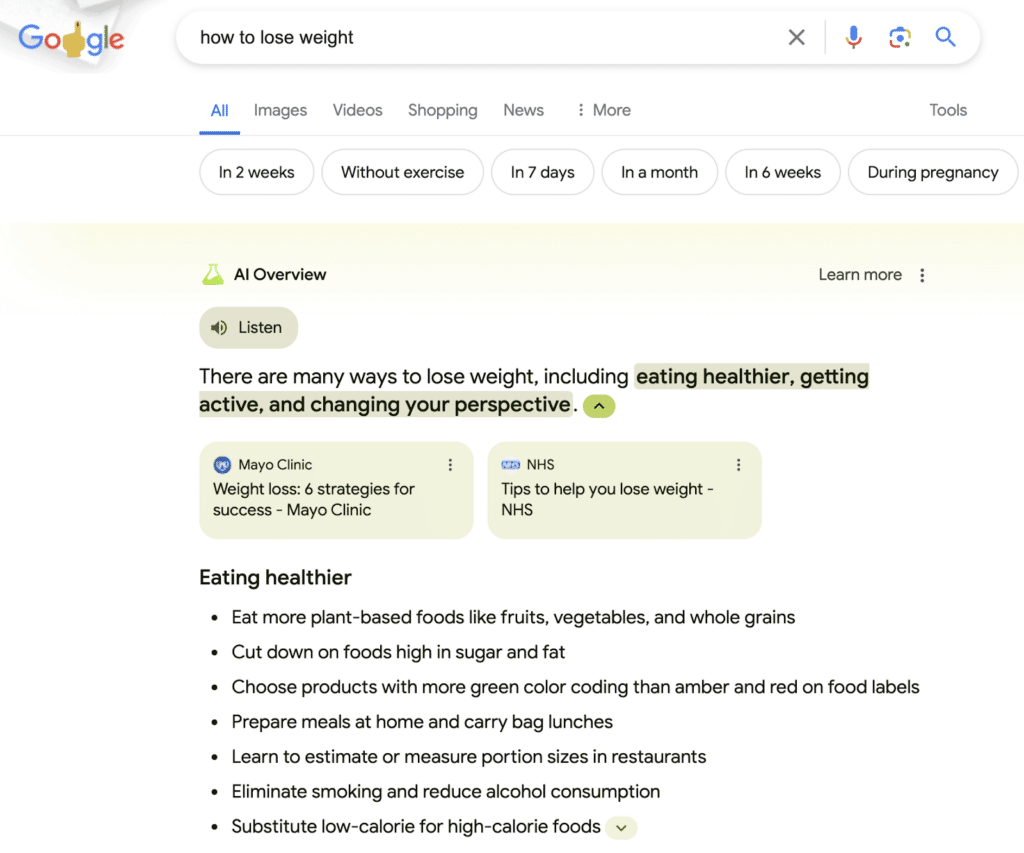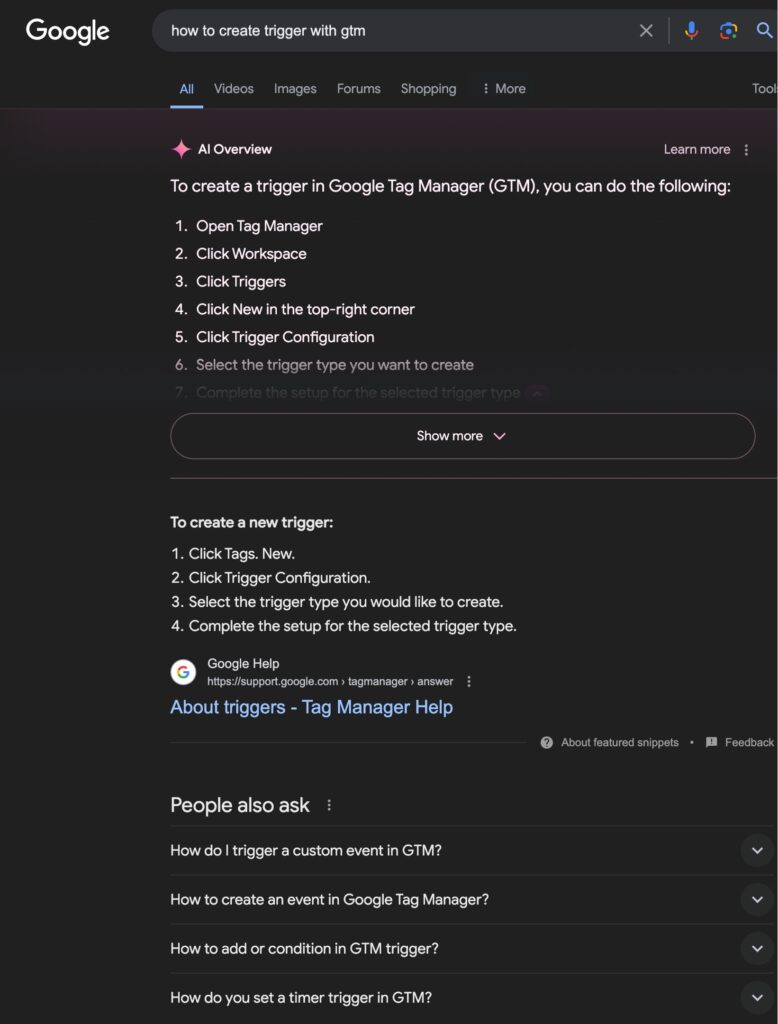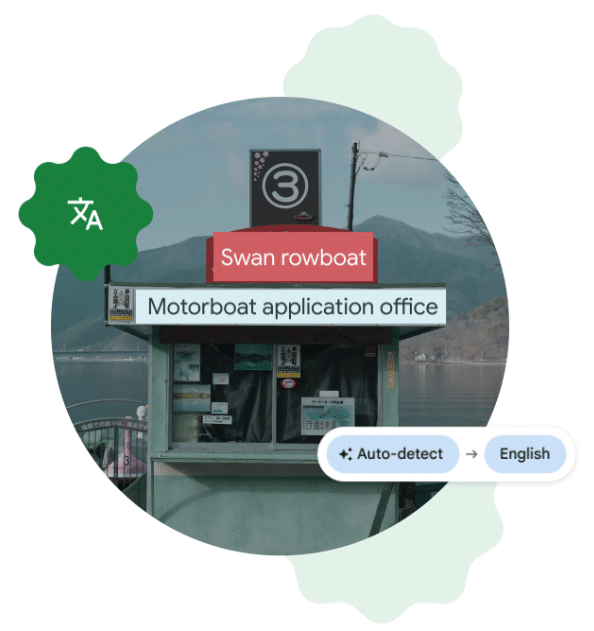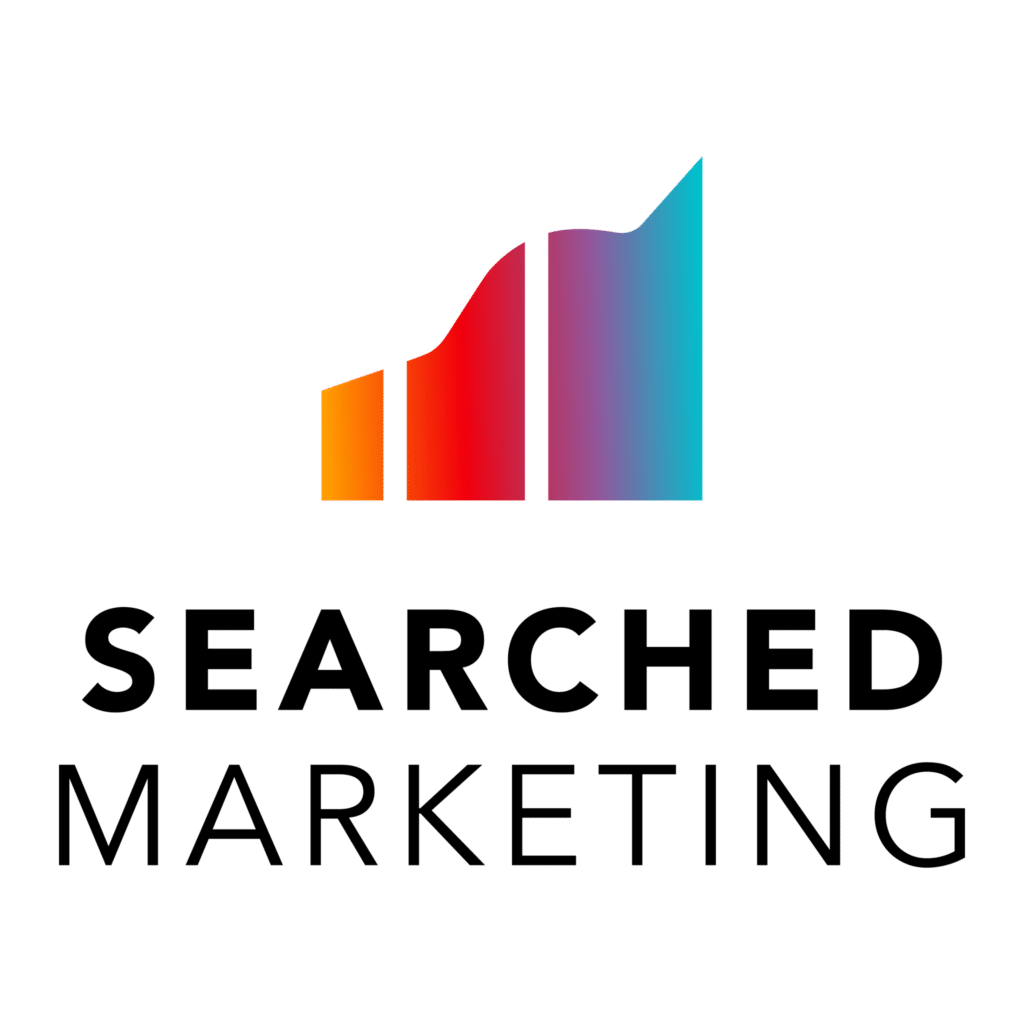Summer is here and with it, some hot summer updates! Google’s launch of its new AI software Gemini, means changes are on the horizon in the digital marketing world. With Google AI now within the search function, visibility will be even more limited for your company.
Our specialized SEO team has compiled a list of takeaways to help your business stay in the ranks within the highly competitive internet world.
What’s Google AI, and Why Is It Significant?
Google’s Gemini AI generates answers by gathering information from different web sources, with links to these sources for more information. Google’s goal with AI Overviews is to improve the search experience by giving users quick answers to their queries so they don’t have to sift through multiple websites.
However, these AI Overviews are set to transform how Google delivers information, as we have already seen, changing search to look more similar to featured snippets (a boxed webpage excerpt that answers a searcher’s question and is often featured at the top of search results in what’s frequently called “position zero”).
Google AI has also seen a big shift towards zero-click searches, meaning users will find the information they need directly in the AI-powered overview without having to visit any websites. This impacts the organic, unpaid and SEO generated traffic for websites ranking below the AI-generated snippet (Semrush).
For small businesses, this can be difficult when trying to launch or promote services. Users would have to scroll all the way past the AI Overview section, then a paid ads section, and then another AI suggestion section before getting to any organic options. Since most users like fast answers, they are more likely to click on the top-generated answers rather than scrolling down continuously to find a local or organic search result.

How the NEWEST Google AI Shift is Affecting SEO
The Customer Journey is SHifting
With the new wave of Gemini pushing out, there has already been a significant shift in the usual routine of running a Google search.
Now, when you look at the search engine result page and click on a featured snippet that catches your eye, the process automatically shifts to running an AI-generated search and getting an AI-generated response without showing you the organic.

As you can see in the image above, the New Google AI search result that has already launched causes a page shift, utilizing almost the entire top fold of the page with AI results rather than organic websites popping up as it had done before this update.
Previously, there was a mix of featured snippets, local, and paid ads…now it’s just AI, and an endless scroll for organic search results below.
Users will now have to scroll almost to the end of page one on Google (which is already past the 3-5 second average attention span) to find search results in articles, websites, and image forms—a task they already dislike.
This reason alone is enough to prioritize making sure your page has perfect SEO practices and indexing so that Google AI can easily scan and access your pages for information and build them into the search results.
MultiMOdal Search in Google AI
Alongside Google AI, Multimodal Search use will be on the rise, with functions like voice search and Google Lens. Due to Gemini being built into the search engine, multimodal queries will become as popular as the usual text searches.
Users can upload images and vocally ask questions. Therefore, alt text on media is even more important than it already was. We’ve already seen increased use of these functions, but in terms of the SEO world, this will boost image optimization and content videos, as images and video shorts will have the potential for more traffic.
We’ve already seen this surge with TikTok videos, YouTube shorts, and even YouTube’s rise to the largest search engine in the world. Users would now rather watch a video explanation or see a photo rather than read an explanation for their search queries.

Google AI and Paid Ads
On top of all this, rumor has it that Google AI in search function wants to start implementing ads within the Google AI overviews. Although this is still in the works, Google ads will supposedly sit in their own subsection within the overview and showcase products, videos, and articles similar to the search query.
We’ve already seen some sneak peaks of this in occasional searches. The ads are positioned in their own horizontal scrolling carousel below the Google AI overview, and they vary from product recommendations to YouTube video recommendations.
This really hammers down the importance of having media on multiple platforms to ensure visibility across the board.
AI isn’t going away anytime soon, so it’s best you learn how to adapt and push forward. For more information on AI and SEO, visit our previous article about ChatGPT and its impact on the Digital Marketing industry.
You can also watch the Google IO Keynote Recap videos to get a full understanding of these new topics.
SO, What Can You Do about Google AI?
Make sure your Site is crawlable.
For any webpage to be considered for AI Overviews, it first needs to be both crawled and indexed by Google.
- Crawling is the process Google uses to discover your website pages.
- Indexing is when these pages are stored in a large database of web pages.
To do this, you need a verified site, a good Google My Business listing, and a trusted team of marketing developers who can push all of your content into Google Search Console.
Create consistent, Quality Content.
Create quality content and you’ll have a higher chance of getting featured in AI Overviews. Because Google’s algorithms are intended to prioritize content that meets stringent quality standards. So, what does it take to meet these standards? It usually comes down to these four factors:
- Accuracy: information in your content must be factually correct and reliable.
- Originality: content should offer unique insights or present information in a new way.
- Expertise: content should be created by SEO experts with a deep understanding of the topic.
- Value to the user: content should address your users’ needs and questions.
How do you ensure the content you create meets these standards? Work with SEO content creators with deep knowledge about your field and implement a rigorous editing process in your content creation workflow.

Improve The User Experience.
User experience is important for ranking in regular search results. So, it’s safe to assume that improving the user experience could also increase visibility in AI Overviews. To optimize the user experience, focus on the following key areas:
- Speed: Your content must load quickly, ideally within a few seconds. If it takes longer, people might leave your site.
- Mobile-friendliness: Your content should be properly visible on mobile devices without the need to zoom in or scroll horizontally. Use a responsive design so your website’s content can automatically adjust to provide a seamless viewing experience on any device.
Work alongside our developer team at Searched Marketing to take care of any user experience issues!
Use On-Page SEO Best Practices.
On-page SEO is the practice of optimizing various aspects of your web pages. To help Google better understand your content and make it eligible to show for relevant queries—and potentially AI Overviews. Here are some key on-page SEO techniques Searched Marketing specializes in:
- Meta Title Tags: are page titles that appear on browser tabs and can also appear in search results.
- Meta Descriptions: are brief descriptions that can appear beneath your pages’ titles in search results.
- Heading Tags: are headings that organize your content, and they use target keywords to help Google understand your content’s focus areas.
- Keywords: are the search queries your content is focused around and should be included throughout the content.

Need Help with Google AI Shifts? Call Searched Marketing!
Does that sound like a lot? Don’t worry—Searched Marketing is here for anything you might need with all these upcoming changes? We are staying educated and up to date so you don’t have to and to ensure your company doesn’t fall behind. SEO best practices will now be more detail-oriented, cover cross-channel marketing, and be more time-consuming than before. Call us, and we’ll take it all off your hands!
